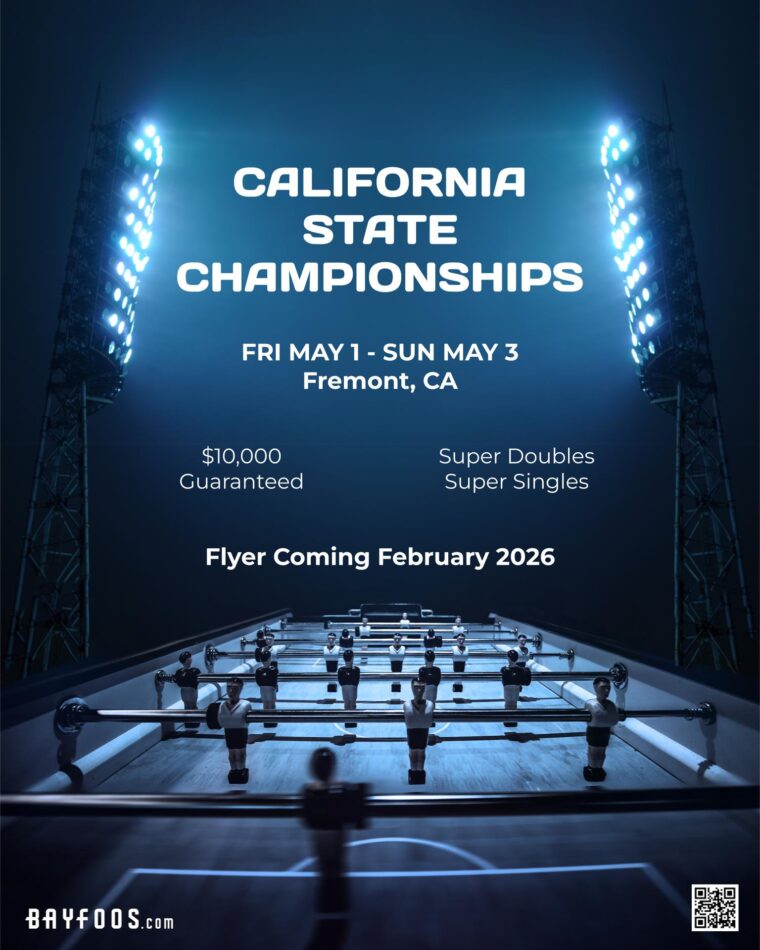
2026 California State Championships will be held at California Billiards in Fremont, California from May 1 to May 3, 2026!
Super Doubles and Super Singles champions will be crowned.
$10,000 in prizes guaranteed.

2026 California State Championships will be held at California Billiards in Fremont, California from May 1 to May 3, 2026!
Super Doubles and Super Singles champions will be crowned.
$10,000 in prizes guaranteed.
Happy New Year everyone! We’ve got 5 events planned for Cal Billiards in January!
| Tues, Jan 6, 2026 | Monster Play Through |
| Tues, Jan 13, 2026 | Monster Play Offs |
| Tues, Jan 20, 2026 | Monster Singles |
| Sat, Jan 24, 2026 | Double Header, $100 added |
| Tues, Jan 27, 2026 | Monster Play Through |
Saturday Double Header
The Saturday Double Header on Jan 24 should be a blast, it’ll be our first weekend tournament in over a month. Expect lots of players and tough competition.
Tables open at 1 pm.
Open Singles at 2 pm.
Shake-n-Bake (aka Open Doubles) at 6 pm ($50 added to the overall pot, plus $50 added for top draw team)
$5 table fee
Open Singles
Get your singles game on.
Each match best 2/3.
More than 13 players: double elimination tournament.
13 or fewer: Swiss System for seeding, single elimination play-offs.
Entry fee:
Handicap 0: $5
Handicap 1-2: $10
Handicap 3+: $15
Shake-n-Bake
Bring a partner if you’ve got one, draw one if you don’t. $50 added for top draw team, plus $50 added to the overall pot.
More than 13 teams: double elimination tournament.
13 or fewer: Swiss System for seeding, single elimination play-offs.
Format may be either Swiss System or Double Elimination. Bring teams will play to 6 against draw teams.
100% payout, plus $50 for top draw team.
Entry fees based on local points:
Draw side:
Handicap 0: $5
Handicap 1+: $10
Bring Side:
Handicap 0: $5
Handicap 1-2: $10
Handicap 3+: $15
Safety Precautions
Masks optional.
Questions? e-mail bayfoos@gmail.com.
Bayfoos October schedule is set! Our regular weekly events (Mondays, Tuesdays, and Thursdays) are all posted on the New Players page. Our Halloween Tournament will be held October 25th (FB event, Google Calendar event), and we’ll do an awards ceremony for the points race as well. Anybody that shows up in costume pays no table fee, and if you can play in costume that’s even better.
The points race is close, especially for the Intermediate and New Player categories. One of our “new players” is giving the intermediate players a run for their money. We’ve only got two events in the race yet, but there is still a lot that can happen.
Our fall points race is looking competitive. We’ve finished four out of nine events, and leaders are starting to emerge.
Brian is in the lead, with 49 points, but Xavier is close with 45. Both Brian and Xavier are showing up every week to play, so this is probably going to stay close.
Vera has a solid lead in our Intermediate category with 32 points, but Jim played well this weekend and got closer. He’s got 24 now, and could close the gap.
And our New Player category is full of great new talent! Babu and Maddy are tied with 21, Imtiaz right behind with 19, and Rishie has 17.
Still lots of time for anyone to catch up, looking forward to seeing everyone coming out over the next few weeks!
We just did some minor site updates. If you see something wrong, drop us a line at bayfoos@gmail.com.
You can now see points race standings.
And you can see live results from our Monster Draw events.
And the calendar and new player information is now up-to-date.
Plus we’ve got our new logo up!